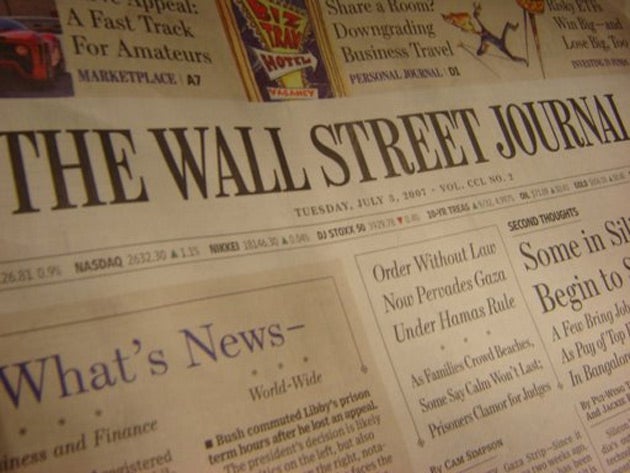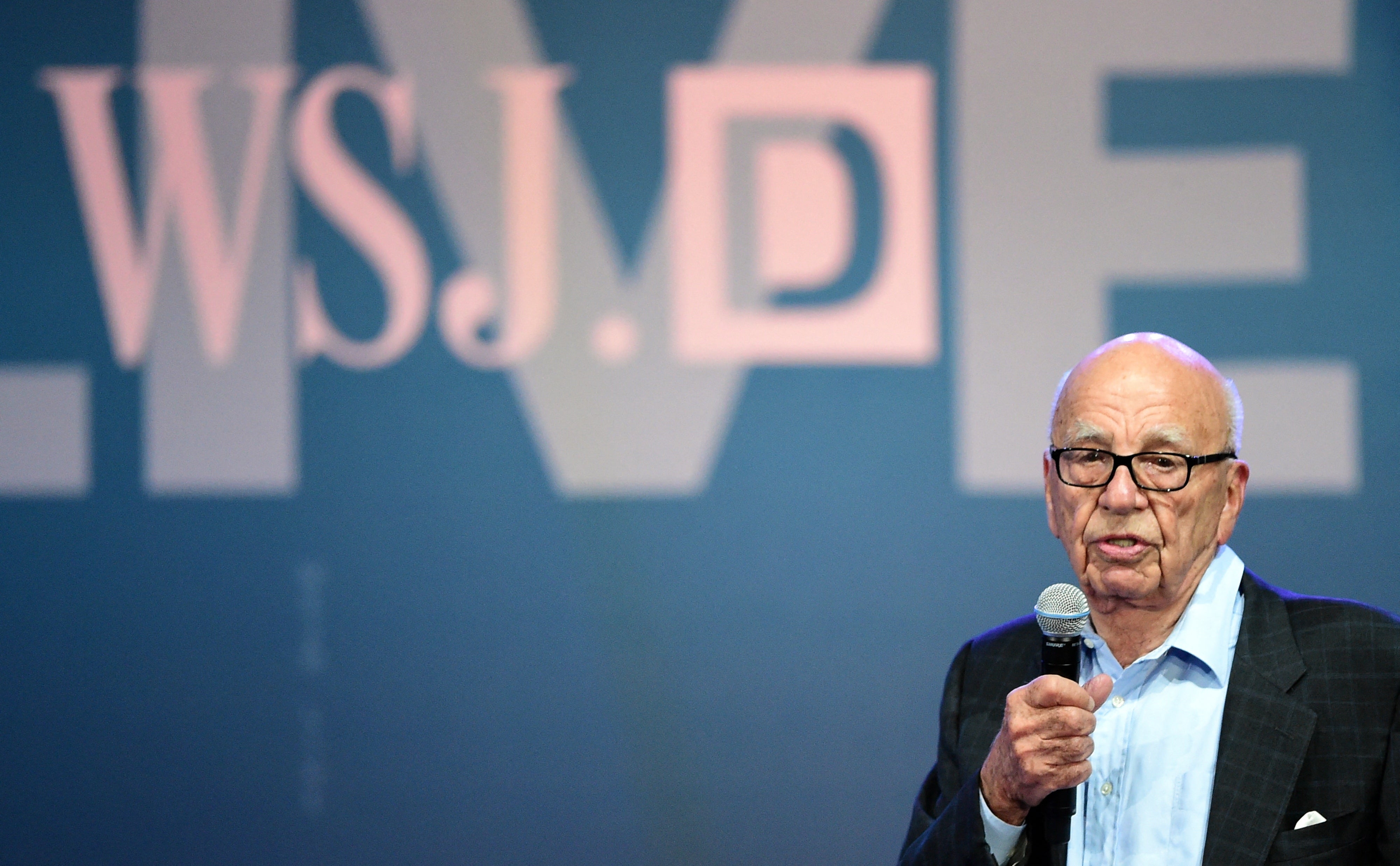President Donald Trump filed a $10 billion defamation lawsuit against The Wall Street Journal after the newspaper published the president’s alleged birthday card to convicted sex offender Jeffrey Epstein – but what will he have to prove to win the case?
The lawsuit filed in Miami federal court on Friday names the paper’s owners, including right-wing media mogul Rupert Murdoch, as well as the paper’s parent companies, Dow Jones and News Corp, and two Wall Street Journal reporters, claiming they defamed Trump.
Weeks after the White House attempted to dismiss the so-called Epstein files as a Democratic “hoax,” the Journal published Trump’s alleged 50th birthday card message to Epstein. The 2003 note was described as including a sexually suggestive drawing and a birthday wish that read: “may every day be another wonderful secret.”
But the lawsuit claims the paper “failed to show proof that President Trump authored or signed any such letter, and failed to explain how this purported letter was obtained.”
Trump’s handling of claims related to Epstein, the child sex predator who died by suicide in a Manhattan jail cell in 2019, has drawn criticism even from his own MAGA base, as many Americans believe the US government is hiding information about Epstein’s associates.
.jpg)
According to experts, The Wall Street Journal could seek reciprocal discovery, and Trump would be forced to answer highly-publicized questions about his relationship with Epstein, and whether he was aware of his crimes.
Here’s what Trump would need to happen to win the lawsuit:
Prove the Journal was lying – or failed to properly fact-check their story
For Trump to win the $10 billion defamation suit, he would have to prove that The Wall Street Journal was lying, or did not fact-check their claims before publishing.
A spokesperson for Dow Jones defended the accuracy of the reporting and their fact-checking of its claims.
“We have full confidence in the rigor and accuracy of our reporting, and will vigorously defend against any lawsuit,” a spokesperson said in a statement.
News Corp did not immediately return The Independent’s request for comment.
According to Damon Dunn, a First Amendment and media attorney, Trump would have to prove the story was false, damaging to his reputation, and published with “actual” malice – a lofty legal standard to reach, Dunn told Business Insider.

“The provenance of the ‘card’ appears suspect, but, even so, is it defamatory that one millionaire sent a birthday card to another in 2003 before Epstein was discovered?” Dunn said, noting the card was allegedly written years before Epstein was convicted of sex crimes.
Former federal prosecutor Chris Mattei said the lawsuit may allow the Journal to seek reciprocal discovery – meaning it can ask Trump to provide additional information or evidence that he did not write the letter, as well as details about his relationship with Epstein and whether he was aware of his crimes.
“If Trump’s defense is that this was false, then any evidence suggesting that he had a relationship with Epstein, the degree to which that relationship was close or not, would be relevant to the question of whether or not it’s likely Trump had any sort of role in this letter,” Mattei said. “And so an aggressive Wall Street Journal here would seek broad discovery about the extent of Trump’s relationship with Epstein.”
Mattei said he felt Trump’s case was unlikely to have merit, and likely stood as a test to “explore what kind of power and leverage he has over the American media.”
“There will be some period of weeks where The Wall Street Journal will be able to file its motion to dismiss if it wants to make a request for discovery, the judgment rule on that request could take a little bit more time,” Mattei said. “And so if it is indeed contested, you could see the initial phase of this, including discovery, playing out over the next six months.”
What Trump is claiming in the lawsuit
Despite the Journal’s defense of its reporting, Trump still claims the Murdoch-owned paper exhibited “glaring failures in journalistic ethics and standards of accurate reporting.”
The story detailed a gift Trump allegedly gave Epstein for his 50th birthday that included a signed note from Trump inside a drawing of a naked woman. The note apparently included the disturbing phrase, “may every day be another wonderful secret,” according to the report.
The filing, however, notes that the Journal did not publish the drawing or the letter that it alleges Trump wrote.

Trump denied writing the letter, going so far as to claim he has never drawn a picture in his life.
“I never wrote a picture in my life. I don’t draw pictures of women,” he said, according to the Journal. “It’s not my language. It’s not my words.”
The Wall Street Journal, however, later fired back in another story, highlighting several images drawn by Trump, including four that were auctioned off during his first term in office.
Trump threatened legal action against the paper, and the two journalists whose bylines appear on the report, Khadeeja Safdar and Joe Palazzolo, were almost immediately targeted by CNN, the report stated.
The president also took to his Truth Social platform to air his grievances about the story.
“The Wall Street Journal, and Rupert Murdoch, personally, were warned directly by President Donald J. Trump that the supposed letter they printed by President Trump to Epstein was a FAKE and, if they print it, they will be sued,” Trump wrote.
Trump also claimed that Murdoch did not want to print the letter, but he “did not have the power to do so,” prompting Trump to file the suit.

After the article was published, Trump said he directed Attorney General Pam Bondi to “produce any and all pertinent grand jury testimony subject to Court approval.” On Friday, the Justice Department sought court approval for that public release.
Federal prosecutors in 2019 charged Epstein with sex trafficking underage girls in both Florida and New York. He died by suicide in jail while awaiting trial.
Trump has threatened other media outlets over coverage
The president has regularly threatened to take legal action against media outlets over unflattering or antagonistic coverage.
His lawsuits against ABC and CBS resulted in controversial settlements that have sparked fears among press freedom advocates that publishers are only emboldening the president’s chilling message to the media.
Now Murdoch, who also owns The New York Post and The Sun, once a close ally, has found himself in the same boat.
Murdoch’s Fox News empire was accused of promoting bogus conspiracy theories surrounding the 2020 election to promote Trump’s campaign.
The network ultimately settled that defamation lawsuit, which was brought by voting machine company Dominion Voting Systems, for a record-breaking $787 million.


.jpg?trim=0,0,0,0&width=1200&height=800&crop=1200:800)

